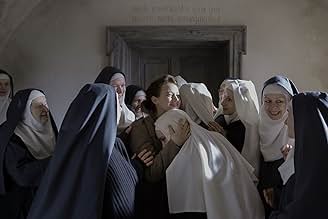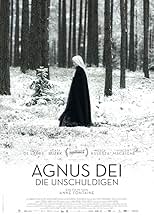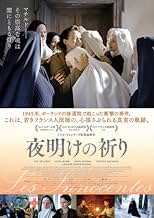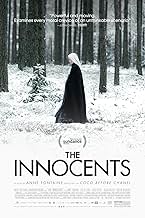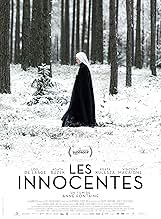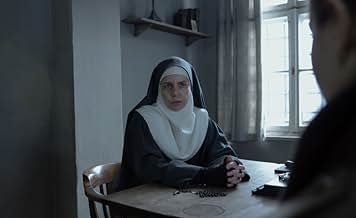1945. Mathilde è una dottoressa della Croce Rossa francese e lavora in una missione per aiutare i francesi sopravvissuti ai campi di concentramento tedeschi. Mentre sta lavorando in Polonia,... Leggi tutto1945. Mathilde è una dottoressa della Croce Rossa francese e lavora in una missione per aiutare i francesi sopravvissuti ai campi di concentramento tedeschi. Mentre sta lavorando in Polonia, una suora le chiede aiuto: nel suo convento, diverse suore sono rimaste incinte...1945. Mathilde è una dottoressa della Croce Rossa francese e lavora in una missione per aiutare i francesi sopravvissuti ai campi di concentramento tedeschi. Mentre sta lavorando in Polonia, una suora le chiede aiuto: nel suo convento, diverse suore sono rimaste incinte...
- Regia
- Sceneggiatura
- Star
- Premi
- 3 vittorie e 13 candidature totali
Recensioni in evidenza
Whenever you hear the word/abbreviation 'WWII', it always bound with nazi Germans. Since this tale takes place just after the war, when the Soviet took over the Poland from them, it is set to reveal one of the extremely hidden secrets. Just imagine how secret it is, like you have read many books and have seen many films regarding the WWII, but you have never heard about this, until now. It is a heart rending tale, but the thing is everything's about the aftermath, how they handled their state of condition.
Mathilde, the French doctor is fetched by a nun from the nearby convent is shocked when she reached there to see most of them are in the final stage of their pregnancy. They were sexually abused by the Soviet soldiers, but now she as to keep it quiet as requested by the mother superior. She's being an atheist and to whom she's treating, the believers, is exactly the opposite kind. But not just her, the nuns as well put aside their differences to overcome their situation.
❝For us nuns, the end of the war does not mean the end of fear.❞
It's right on the coldest winter, does not tell about the original violence, but there's still a few incidents about the army atrocities, how they treated innocent nuns, even the Red Cross members. But remember nothing was the actual depiction. It would have been even better if it was a documentary film. Doing some research and telling us the tale, reading exactly as what was written in the diary. But the film was not bad, except the scene to scene, event to event it was very slow to move, except right on the point.
The story has a twist, but it was not like very powerful. It depends on how you would consider it. Because for me, I felt it was too cruel, hard to take on. The story about church people means, you would expect a gentle kind. Or even in such situation, as in this film, to react as much as possibly generously as what they're known for. But in the first place, it was no ones fault. They all fighting for the same reason, especially keeping the outside world in mind, each one reacted differently. So it is understandable, but not all the acts were respectable.
As the director said in her interview, this is a period film, but pretty much the same in the contemporary world where war is on. The violence against the innocent women. So it is a debatable topic. And if it was directed by some male filmmaker, he might have risked with the violences in the flashback scenes to bring more depth in the narration. The present film is kind of compromises on that, but still not easy to watch everything it shows. Particularly for the families. Great performances by all. One of the best films on this theme and of the year. The film is not to be ignored. Despite not about the war, but just like 'Under Sandet', about the following event.
8/10
The year is 1945, just after the end of World War II. A French Red Cross unit is sent into Poland. Their mission was to care for French survivors of the camps. Among the Red Cross staff is a young medical student, Mathilde Beaulieu, played by Lou de Laâge. Early in the film, we learn a terrible secret about the nuns in a nearby convent. Many of them are pregnant, because they were raped by Russian soldiers. Mathilde learns of this, and she is allowed to enter the convent, where she meets Sister Maria, a French-speaking nun played by Agata Buzek. To go further with the plot would diminish the movie, so I'll stop at that point. Let me just say that the situation is even worse than it seems.
This is a movie that is not to be missed. Yes, it's grim, but postwar Poland was a grim place. The film takes place in winter, so snow covers everything, and even the Red Cross staff is miserable. Obviously, for the nuns in the convent, everything is much more terrible.
The acting in the film by the two lead actors is outstanding. Also, the ensemble acting was wonderful. There were no weak links, and no obviously staged scenes. Everything looked real--cold, dark, and threatening--but real.
This is one of those movies where many frames could be lifted from the film and used as a photograph. My compliments to cinematographer Caroline Champetier, who did a brilliant job.
We saw this film at the excellent Little Theatre in Rochester, NY. It will work well enough on the small screen, but the large screen gives you a better sense of the isolation of the convent. The nuns don't expect help from outside. They only expect harm to come to them. Mathilde is the exception, and they (and we) understand that. Small screen or large screen, don't miss this movie!
P.S. The film is based on the experiences of a French doctor--Madeleine Jeanne Marie Pauliac. She was a member of the French Resistance, and did, indeed work tirelessly in Poland after the war. For artistic reasons, director Fontaine focused on Dr. Pauliac's work with the pregnant nuns. The rest of her accomplishments would also make a fascinating movie.
Lo sapevi?
- QuizAnne Fontaine originally met with Agata Kulesza in Poland because she was an admirer of her work, but told her that she didn't wish to cast her as the Mother Superior since she thought her too sexy for the role. The actress laughed and asked the director if she could put on a veil and read an extract for a Polish work. Once she did, Fontaine decided to give her the part.
- Citazioni
Maria: You know, faith. At first, We're like a child that his father holds by his hand, who feels safe. A moment comes and I think he always comes where the father will let you go. We're lost, alone in the dark. We call, nobody answers. We're getting ready, we're surprised. We're hit in the heart. That's the cross. Behind all joy, there is the cross.
- Colonne sonoreVox clara ecce intonat
Written by Hildegard von Bingen
Performed by Elsa Papatanasios, Emmanuelle Huteau, Marie George Monet and Nathalie Liess
I più visti
- How long is The Innocents?Powered by Alexa
Dettagli
- Data di uscita
- Paesi di origine
- Siti ufficiali
- Lingue
- Celebre anche come
- Cordero de Dios
- Luoghi delle riprese
- Aziende produttrici
- Vedi altri crediti dell’azienda su IMDbPro
Botteghino
- Budget
- 6.400.000 € (previsto)
- Lordo Stati Uniti e Canada
- 1.065.665 USD
- Fine settimana di apertura Stati Uniti e Canada
- 30.896 USD
- 3 lug 2016
- Lordo in tutto il mondo
- 7.400.301 USD
- Tempo di esecuzione1 ora 55 minuti
- Colore
- Mix di suoni
- Proporzioni
- 1.85 : 1





